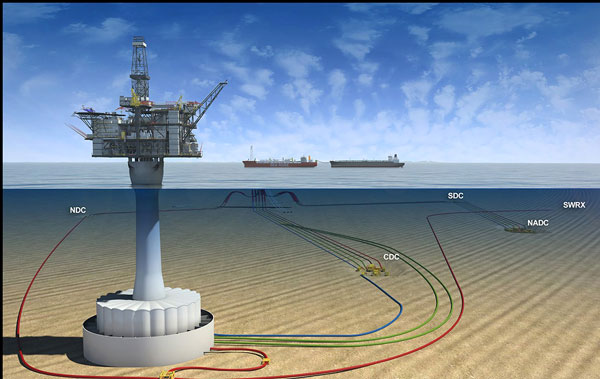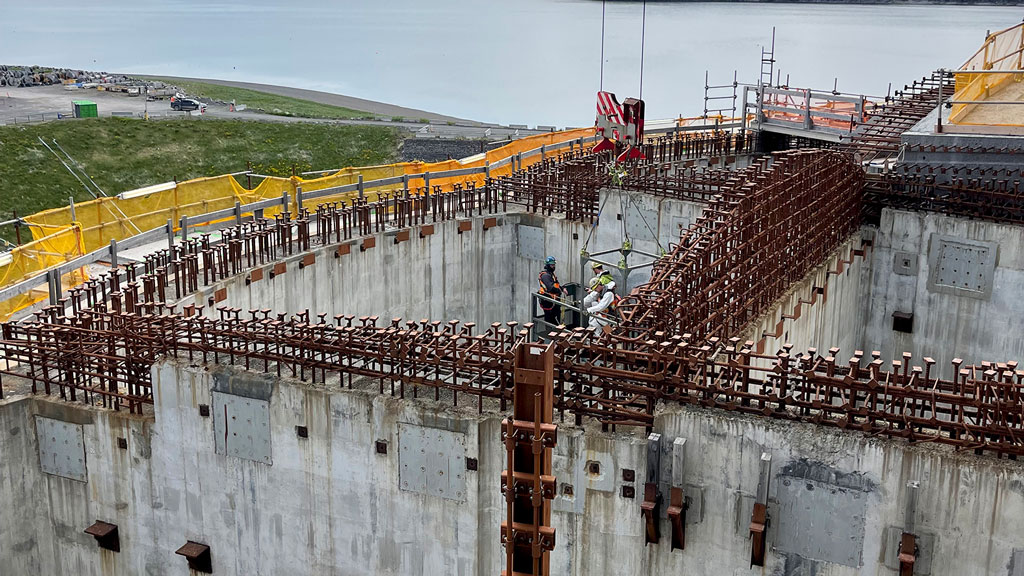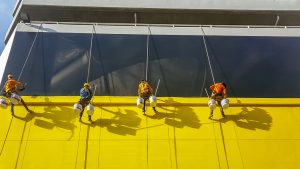The skilled trades of Newfoundland and Labrador are celebrating the successful conclusion of an intense 69-day project-within-a-project to reach a major milestone on the West White Rose job in Argentia, N.L.
A contingent of 1,500 workers employed in a dozen trades worked three shifts a day over that period to complete a conical concrete gravity structure (CGS) rising 139 metres for their employers, the SNC-Lavalin-Dragados-Pennecon General Partnership.
Direction was provided by a four-person trades leadership committee consisting of Trades NL executive director Darin King and three union business managers, working with the contractors. King noted besides the actual daily work by the trades there were technical operations, field co-ordination, planning and logistics to be done in addition to restart hiring, given that work on the CGS was halted in 2020 at the start of the pandemic.

“It’s a great project,” said King. “We’re very proud of it. Our men and women have done some great work out there.
“All involved with the project are to be commended for this achievement.”
The CGS is the first component of a fixed drilling platform, to be followed by a topsides facility. The work is being undertaken for Cenovus at the Argentia Graving Dock 130 kilometres from St. John’s.
When the rig is completed in 2025 it will be towed out to sea and connected to the existing SeaRose floating production, storage and offloading vessel, expanding Cenovus’s production capacity in the White Rose oilfield.
But the collective agreements signed by the unions guaranteed adequate trades to finish the West White Rose work so when Cenovus called for a resumption of the build in the spring of 2022 after a recalibration of the ownership structure and royalties framework, the business managers for each trade sprang into action to recall the workforce, King explained.
“The biggest challenge we had and biggest discussion we had in the restart was, ‘Are we going to be able to get the labour and where are we going to get it from?’” said King. “That’s the guarantee they get, we will get the labour for them.”
When the $3.2-billion expansion project was halted in 2020, King explained, many of the workers found jobs across Canada as governments ramped up infrastructure spending.
Workers from 15 of 16 Trades NL member unions have worked on the CGS. The cement pours had to wait until this spring to ensure the right weather and that there would be a cushion of time to take care of complications.

The technique used is a slip pour, King said, with the process starting at the bottom involving a repetition of pour, “slip the formwork up,” pour again and slip the formwork up again.
The work completed during the 69 days ending June 5 added 92.35 metres to the existing project structure, bringing the height to 139.2 metres, equivalent to a 35-storey building. The three biggest trades involved were scaffolders, who are members of the Carpenters’ union, ironworkers and labourers, King said.
A procurement page on the Cenovus site outlines dozens of contracts to be filled, almost each one requiring skilled workers. Jobs included erecting scaffolding, hoist and crane operators, post-tension work, formwork, installation of steel fabrications, welding and testing, rebar, installation of ballast support structures and endless concrete pouring and testing (76,000 cubic metres).
“The scaffolding actually is one of the critical trades that would be active throughout the project because as we do the slip pour, the scaffolding goes up with it,” said King.
Bricklayers, carpenters, electrical, heat and frost, ironworkers, labourers, millwrights, operating engineers, painters, sheet metal, teamsters, plumbers, pipefitters and others all have worked on the CGS.
“The Teamsters do the driving onsite and they do the warehousing,” said King. “The steel girders will be Ironworkers’ Local 764…There’s some rope access as well.”
Besides the council of four that includes King, there is a director of labour relations who works right onsite “handling a multitude of issues by the hour,” King said. Among them, he admitted, with such an abundance of tasks there sometimes are issues related to jurisdiction over scopes of work.
King said the trades were confident in their ability to achieve success on the project but there’s still relief that the job was completed safely. The Pennecon Health and Safety Management system is in use on the job.
Work will continue over the next two years until the rig is towed out to its final station. There are still over 1,000 workers currently employed on the next phase.
Follow the author on Twitter @DonWall_DCN








History will be the determining factor whether this will have been a good idea. Some of these mega projects have had their individual concerns.